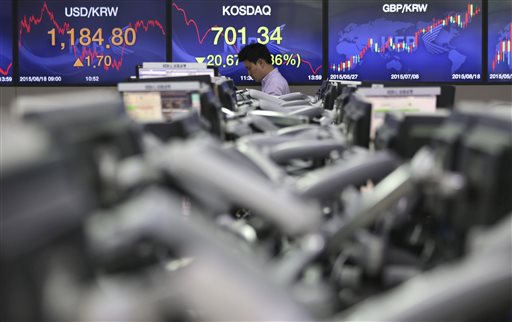
An employee of a bank walks by the screen showing the foreign exchange rate, left, at the foreign exchange dealing room in Seoul, South Korea, on Tuesday, Aug. 18, 2015. Asian shares fell on Tuesday, with Shanghai leading the declines as investors doubted Beijing’s commitment to prop up shares while Bangkok slumped after a bomb attack in the Thai capital. AP PHOTO/LEE JIN-MAN
HONG KONG–Asian shares fell on Tuesday, with Shanghai leading the declines as investors doubted Beijing’s commitment to prop up shares while Bangkok slumped after a bomb attack in the Thai capital.
The dollar headed higher against the euro, helped by improving confidence in the US housing sector ahead of the release of US central bank minutes.
Shanghai closed down 6.15 percent, or 245.51 points, at 3,748.16–its biggest daily fall in three weeks–while Hong Kong lost 1.43 percent, or 339.68 points, to end the day at 23,474.97.
Tokyo closed down 0.32 percent, or 65.79 points, at 20,554.47. Sydney fell 1.20 percent, or 64.55 points, to 5,303.10 and Seoul dipped 0.62 percent, or 12.26 points, to close at 1,956.26.
Thai shares, meanwhile, notched their steepest decline this year of 2.56 percent and the baht slid to its lowest level since 2009 after a bomb attack killed at least 20 people and injured scores.
Asian shares gave up early gains driven by a higher close on Wall Street as jitters about the health of China’s economy spread across the region.
Traders in China said they now doubt Shanghai will be able to break above the key 4,000 point level soon without evidence Beijing will unleash fresh stimulus.
“The market lacks the momentum to go up,” Shen Zhengyang, an analyst at Northeast Securities, told AFP. “In the short term, the market will fluctuate on the weak side.”
Markets have long been on edge about slowing growth in China, but concerns reached fever pitch last week after a shock devaluation of the yuan sparked fears it is stalling more than previously thought.
The steep fall in the yuan scared many investors into dropping Chinese assets and last week Shanghai and Hong Kong shares saw $531 million net outflows–the ninth week of sales out of 10.
Fed in focus
China’s central bank on Tuesday said it pumped 120 billion yuan into the money market, which state media said was the largest single-day cash injection since January 2014.
Even a pledge Friday by the securities regulator, to keep supporting equities through the state-backed China Securities Finance Corp. for years to come, has not reassured some dealers.
“Investors ran for the exit when the government failed to step in to support the market,” Steve Wang, chief China economist at Reorient Financial Markets, told Bloomberg News.
“The CSF has become a main player in this market so everyone is watching it. People panic when it stops buying.”
Markets are now awaiting the release of minutes from the Federal Reserve on Wednesday, which could shed light on the US central bank’s timing for an interest rate rise.
Speculation the Fed will soon raise its key rate for the first time in almost a decade has strengthened the dollar, while concerns the fall in the yuan could spark a currency war has dragged on many Asia-Pacific currencies.
In Tokyo the dollar was quoted at 124.32 yen, down from 124.41 yen in New York late Monday.
But it strengthened against the euro, which traded at $1.1068 and 137.60 yen from $1.1078 and 137.81 yen.
The Thai baht fell to 35.556 against the dollar, touching its lowest point since April 2009 on fears a deadly bombing in the capital could hit the vital tourism sector.
Bangkok shares slumped 2.56 percent, the most in eight months, led by a slump in tourism stocks. Transport-related companies were also hit.
Oil prices slipped as fears of a lasting global oversupply weighed on the market.
US benchmark West Texas Intermediate for September delivery was down 32 cents to $41.55 in afternoon trade. Brent crude for October gave up 11 cents to $48.63.
Gold was at $1,119.83 compared to $1,121.23 late Monday.
In other markets:
— Wellington fell 0.29 percent, or 16.66 points, to 5,710.76.
Fletcher Building was 1.81 percent off at NZ$7.58 while Contact Energy rose 0.76 percent to NZ5.28
— Taipei slid 0.44 percent, or 36.2 points, to 8,177.22.
Taiwan’s biggest bank Cathay Financial Holding fell 3.86 percent to Tw$44.80 while Fubon Financial Holding declined 3.38 percent to Tw$51.40.
— Manila ended flat, losing 3.39 points to 7,333.45.
Top-traded Universal Robina rose 1.06 percent to 190 pesos, SM Prime Holdings was flat at 20 pesos, while GT Capital dropped 1.22 percent to 1,294 pesos.
— Mumbai eased 46.73 points, or 0.17 percent, to 27,831.54.
Engineering firm Tata Elxsi gained 19.71 percent to 2132.10 rupees, while Indian Bank slid 4.89 percent to 153.70.
— Kuala Lumpur rose 7.06 points, or 0.45 percent, to 1,579.60.
Maybank added 2.93 percent to 8.43 ringgit and Tenaga Nasional gained 0.58 percent to 10.46 ringgit, while Public Bank lost 0.11 percent to 17.96 ringgit.
— Singapore fell 0.58 percent, or 17.70 points, to 3,049.65.
City Developments eased 0.56 percent to Sg$8.95 while Singapore Airlines gained 1.5 percent to Sg$10.16.
— Jakarta ended down 1.63 percent, or 74.91 points, at 4,510.48.
IT firm Multipolar Technology gained 4.69 percent to 1,340 rupiah, while media company Media Nusantara Citra fell 6.37 percent to 1.910 rupiah.
— Bangkok closed down 2.56 percent, falling 36.13 points to 1,372.61.

